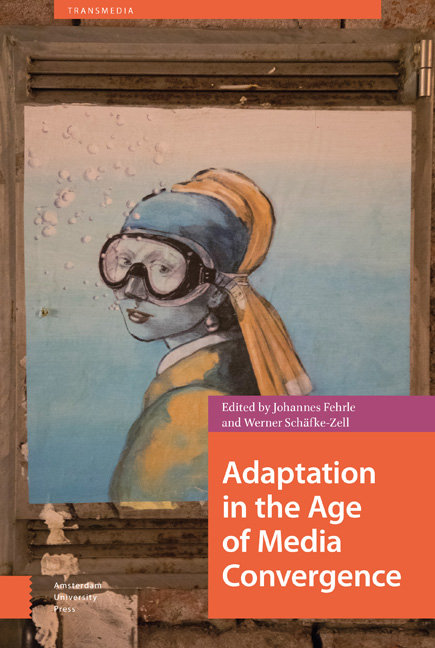Book contents
- Frontmatter
- Contents
- 1 Introduction: Adaptation in a Convergence Environment
- 2 Adaptation as Connection: A Network Theoretical Approach to Convergence, Participation, and Co-Production
- 3 Filing off the Serial Numbers: Fanfiction and its Adaptation to the Book Market
- 4 From Paratext to Polyprocess: The “Quirky” Mashup Novel
- 5 “You Just Got Covered”: YouTube Cover Song Videos as Examples of Para-Adaptation
- 6 Masters of the Universe? Viewers, the Media, and Sherlock's Lead Writers
- 7 Alien Adapted (Again and Again): Fictional Universes between Difference and Repetition
- 8 “Everything is Awesome:” Spreadability and The LEGO Movie
- 9 Localization as Adaptation in the Wolfenstein Franchise
- Index
4 - From Paratext to Polyprocess: The “Quirky” Mashup Novel
Published online by Cambridge University Press: 21 November 2020
- Frontmatter
- Contents
- 1 Introduction: Adaptation in a Convergence Environment
- 2 Adaptation as Connection: A Network Theoretical Approach to Convergence, Participation, and Co-Production
- 3 Filing off the Serial Numbers: Fanfiction and its Adaptation to the Book Market
- 4 From Paratext to Polyprocess: The “Quirky” Mashup Novel
- 5 “You Just Got Covered”: YouTube Cover Song Videos as Examples of Para-Adaptation
- 6 Masters of the Universe? Viewers, the Media, and Sherlock's Lead Writers
- 7 Alien Adapted (Again and Again): Fictional Universes between Difference and Repetition
- 8 “Everything is Awesome:” Spreadability and The LEGO Movie
- 9 Localization as Adaptation in the Wolfenstein Franchise
- Index
Summary
Abstract
Applying broad notions of adaptation, this chapter seeks to bring “recombinant adaptation” – mashups and remixes on digital platforms – in dialogue with Gerard Genette's idea of the paratext as a text's “relations with the public.” It takes four steps towards investigating how literary publishing houses such as Quirk Books respond to recombinant adaptation. Firstly, it delineates the paratexts of mashup novels as performative zones of transaction. Secondly, it examines the question of how paratexts regulate the quasi-religious textuality of fandom participation. Thirdly, it looks at the role of paratextual canonization within this textuality. And finally, it argues that printed products within the field attempt to perform a nostalgic authorization and re-materialization of literature, highlighting the haptic and material qualities of the book. Adapting the term “polytext,” the chapter calls these multifarious paratextual transactions the “polyprocess.”
Key words: Paratext; mashup novel; recombinant adaptation; fandom; polytext/polyprocess; remix
Introduction
This essay seeks to bring the field of “recombinant adaptation” – mashups and remixes on digital platforms – in dialogue with the Genettian idea of the paratext. Genette held that paratexts shape a given text's “relations with the public.” More recently, Jonathan Gray has applied the notion of paratext to media franchises, highlighting the active role of paratexts in creating and continuing franchise texts. Dorothee Birke and Birte Christ have elaborated Genette's ideas for a situation of convergence culture and transmedia storytelling, examining how paratexts fulfill interpretive, commercial, or navigational functions in determining contemporary readers’ transmedia experience of narratives.
This chapter takes four steps towards investigating how literary publishing houses respond to the ubiquitous remixes and mashups to be found on lowthreshold digital platforms of participation. It will, first, delineate paratexts as zones of transaction, shifting research emphases from textual towards performative concerns and highlighting the way cultures negotiate textual distribution and circulation. Secondly, it will examine the question of how paratexts regulate the quasi-religious textuality of fandom participation; thirdly, the role of paratextual canonization will be a special focus within this textuality. Finally, the chapter argues that printed products within the field attempt to perform a nostalgic authorization and re-materialization of literature, highlighting the haptic and material qualities of “bookishness.”
- Type
- Chapter
- Information
- Adaptation in the Age of Media Convergence , pp. 87 - 110Publisher: Amsterdam University PressPrint publication year: 2019



